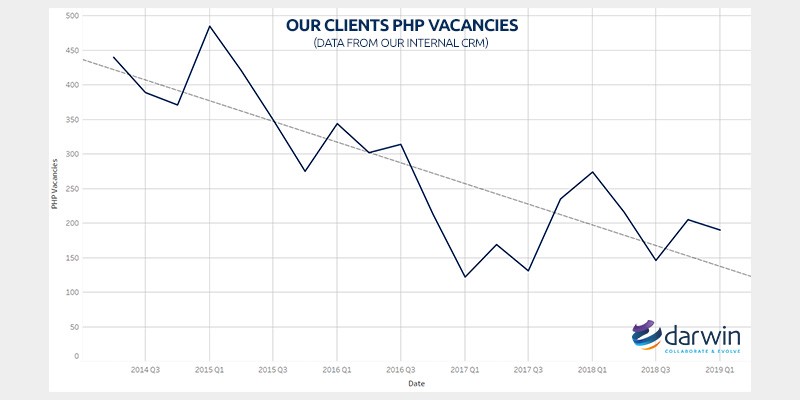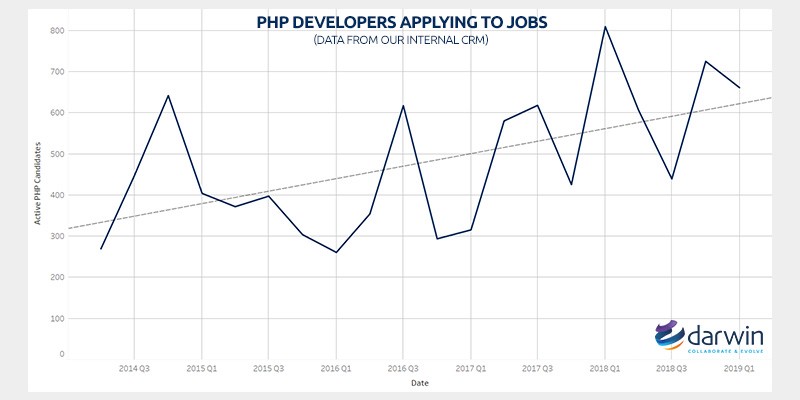Opening up the box that inspired my career as a developer
 Image by Aphinya Dechalert. The mysterious box of PHP.
Image by Aphinya Dechalert. The mysterious box of PHP.
PHP is something that we don?t really hear about in mainstream media. Angular, React, Node.js, and Python are all the rage nowadays. Even computer science degrees focus their efforts on Java and C languages.
Meanwhile, PHP seems to be sitting in the corner, watching as everyone else gets the spotlight.
I started properly coding when I was about 15, and PHP was my first encounter with the act of creating digital products. While it?s been a long journey since then, including forks that allowed me to traverse through Java and JavaScript, PHP has always made sure to crop up in my career in some form or another.
So is PHP dead or alive? Are we tunnel-visioned by all the chatter about JavaScript-related topics? It?s time we open the box and find out.
79% of the Web
When anyone mentions PHP, it often conjures an air of derision towards the programming language. According to a report by W3Techs, though, it appears to be running 79% of the web. Despite the bad rep it garnered back in the 1990s and early 2000s for being insecure, PHP has managed to cling to the title of most used server-side language.
However, a majority of this success can be due to its affiliation with WordPress. The wildly popular CMS dates back to 2003, just as the internet and personal blogs started to push their way into mainstream popularity. It managed to beat out Google?s Blogger as the main non-technical market?s CMS of choice.
WordPress was designed for your regular Joe and did everything in its power to be groundbreakingly easy as a creation of its time.
During Matt Mullenweg?s talk in Auckland, New Zealand, in 2014, he mentioned that Squarespace?s Super Bowl ad gave WordPress a free advertising boost, as people used WordPress as the platform for comparison.
Since WordPress is built in PHP, supported by almost every shared hosting provider, and still holds 61.5% of the internet under its wing, PHP as a language doesn?t seem to be going anywhere any time soon.
Even if WordPress decides to completely rebuild itself in a different language, there is still a large number of legacy sites that will need to migrate out and into the new setup.
A Shifting Landscape
PHP?s tightly coupled relationship with WordPress has contributed to how the programming language is viewed by developers. It is often related to theme and plugin development for WordPress?s ecosystem rather than anything else.
Job prospects outside of WordPress-related activities are often tied to legacy custom-made platforms that were originally built in PHP. It is not often a natural choice for startups or new business projects to put the language on the table as a potential candidate.
According to Darwin Recruitment, a UK-based recruitment agency that published their recruitment demands data, the experience with PHP recruitment shows a consistent downward trend:
 Image by Darwin Recruitment.
Image by Darwin Recruitment.
However, there is a competitive trend of increasing applications for PHP jobs. This inverse effect does not indicate that the competitiveness of PHP as a potential job has lessened over time.
 Image by Darwin Recruitment.
Image by Darwin Recruitment.
But this is one of many potential agencies that may have a different trend. In contrast, worldwide interest in the search term ?PHP? over the past five years has been consistent with a slight downward trend, with China and the Philippines being the most popular countries doing the searches.
This interestingly coincides with how the search volume for ?WordPress? appears, with corresponding dips and peaks.
 Google Trends, search volume results from the past five years. Blue = PHP. Red = WordPress.
Google Trends, search volume results from the past five years. Blue = PHP. Red = WordPress.
How?s the Theme Market?
With PHP being tied up with WordPress, custom-made or stock theme and plugin creation appear to be the main commercial avenues ? especially if you?re looking to go freelance.
ThemeForest is currently the biggest commercial marketplace for WordPress-related stock assets, with 114 authors currently making more than $1 million ? a seemingly big but actually small number in a marketplace of 47,000 active WordPress themes on sale. There is no easy way to ascertain what the average number of items is per author, but it is unlikely that their combined output is more than 10%.
While it may be a good source of passive income, it may take a bit more work to run it as a business. However, anything that requires work often pays its own dividends.
In 2013, hosting giant Bluehost acquired Mojo Themes and rebranded it as Mojo Marketplace in an attempt to cash in on the WordPress theme market. However, it hasn?t seen as much success as Envato?s ThemeForest, with a majority of its top themes failing to reach 1,000 sales.
Conclusion
PHP isn?t quite dead, but it isn?t fully alive either ? not in an independent manner like JavaScript is currently in the development ecosystem. The server-side language?s relationship with WordPress is an intimate one and rests on the platform?s long-term uptake by general users.
With PHP being an integral part of a content creation ecosystem, it is unlikely to disappear in a year or two or any time soon. Hosting companies also play a role as they continue to support WordPress as the main CMS of choice, making it much more accessible to general users than other server-side languages like Java and C++.
Despite all the chatter about PHP dying, it?s not. Not really. Not as long as WordPress is alive and kicking, and WordPress appears to be doing alright. It is just unfortunate that a lot of legacy PHP code is tied up with old versions of WordPress that site owners haven?t quite gotten around to updating.
The thing with PHP is that it also has strong communities running non-WordPress-related activities such as Laravel and Symphony ? things that I haven?t really explored here specifically. PHP itself is also actively maintained.
So overall, PHP is doing just fine.
Thank you for reading.


